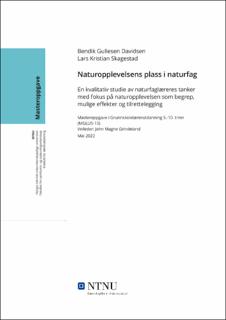Naturopplevelsens plass i naturfag
Master thesis
Permanent lenke
https://hdl.handle.net/11250/3017056Utgivelsesdato
2022Metadata
Vis full innførselSamlinger
- Institutt for lærerutdanning [3604]
Sammendrag
Denne studien har som mål å undersøke hvordan naturfaglærere forstår begrepet «naturopplevelser», hvilke effekter de oppfatter at naturopplevelser kan gi, og hvordan de tilrettelegger for dette i naturfagundervisningen. For å undersøke dette er det brukt en kvalitativ tilnærming med semistrukturerte intervjuer av fire naturfagslærere fra Trøndelag. Den tematiske analysen har bidratt til å se etter sammenhenger mellom lærernes tanker om naturopplevelser.
Resultatene viser at det er en bred forståelse av begrepet «naturopplevelse», og atlærerne verdsetter ulike elementer ved den. Det fremkommer også at det kan være forskjell i naturopplevelser for barn og voksne. Voksne ser ut til å oppsøke opplevelser som fremmer rekreasjon og avkobling, mens barn i større grad foretrekker aktiviteter og spenning. Videre pekes det på noen mulige effekter som kan komme gjennom å interagere med naturen eller gjennom naturopplevelser. Blant annet kan dette fremme holdninger og et ønske om å ta bærekraftige valg. Studien ser også på hvorvidt mer erfaring i naturen kan bidra gjenoppbygge en økende distansering fra naturen. Det rettes også fokus mot hvorfor naturopplevelser blir presisert i læreplanen, noe som blir sett opp mot en egen- og nytteverdi. Resultatene indikerer at innhold i læreplanen som ikke er kompetansemål, kan være vanskelig å anvende. Dermed kan det oppleves som utfordrende å legitimere naturopplevelser i naturfag. Lærerne uttrykker at de er positive til å bruke naturen i egen undervisning, men at læreplanen i noen tilfeller kan være en hindring. Hensikten med denne studien er derfor å åpne opp for legitimering av naturopplevelser i naturfag, og skolen for øvrig, og samle noen tanker om hvordan tilrettelegging for dette kan gjennomføres. This thesis aims to investigate how science teachers understand the concept of «nature experiences», what effects they believe experiences in nature can give, and how they facilitate this in science teaching. In order to examine this, a qualitative approach has been used with semi-structured interviews of four science teachers from Trøndelag, Norway. The thematic analysis aimed to look for connections between the teachers’thoughts about nature experiences.
The results show that there is a broad understanding of the concept "nature experience", and that teachers value various elements of it. Additionally, the results reveal that there may be differences in nature experiences for children and adults. Adults seem to seek outexperiences that promote recreation and relaxation, while children prefer activities and excitement. Furthermore, the findings point out some possible effects that can come through interacting with nature or through nature experiences. Among other things, this can promote attitudes and a desire to make sustainable choices. The study also looks at whether more experience in nature can help rebuild a decrease in nature connectedness. The focus of the study is also on why nature experiences are specified in the curriculum, which is seen in the light of inherit and useful value. The results indicate that content in the curriculum which are not competence goals can be difficult to apply. Thus, it can be perceived as challenging to legitimize nature experiences in the science subject. The teachers express that they are positive about using nature in their own teaching, but that the curriculum in some cases can be a hinderance. The purpose of this study is therefore to argue for the legitimacy of nature experiences in science, and the school in general, and gather some thoughts on how to facilitate this.
